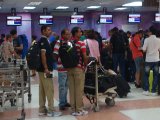Excessive commissions are promoting a ''culture of rip-offs'' that will undermine and possibly destroy Phuket tourism eventually, the businessman believes.
His call for action comes with new laws to be imposed from October in China that will prevent people from becoming victims of commission-based package holidays to Phuket.
''Zero-baht tours'' rely on travellers being pressured into making purchases so commissions can be extracted to give the operator a profit.
But many independent travellers are also subjected to excessive commissions they aren't told about.
The expat businessman, who prefers to remain anonymous, says he knows of elephant trekking operations on Phuket that pay 50 percent commission to tuk-tuk or taxi drivers who bring customers.
''It's 1000 baht to ride the elephant and whoever brings the rider gets half of that,'' he said.
''If the Department of Special Investigation is trying to clean up the taxis and other groups that are taking advantage of tourists, then it has to be across the board,'' he told Phuketwan.
''Taking these commissions instills a mindset and it reinforces the feeling that this is the normal way of doing business, of ripping everybody off as a way of life.''
Tuk-tuk drivers in parts of Phuket's west coast are known to have tried to take over tour operations to act as driver-guides and gain access to larger commissions.
Tourists at Phuket International Airport are also sometimes ''kidnapped'' on arrival and taken to agency outlets where attempts are made to sell them accommodation and tours that the visitors don't need for high commissions.
Excessive fares charged by tuk-tuk and taxi drivers on Phuket are obvious. But behind the scenes, other hidden commissions threaten to become part of the Phuket ''culture.''
''There are a lot of good people on Phuket who are honest and diligent but there is also a subculture here of people that, any way and every way, rip off tourists,'' the expat businessman says.
Gems outlets and latex product outlets and some markets arranged - without the knowledge of tourists - to pay large commissions to bus, taxi and tuk-tuk drivers, he says.
''Thirty five percent is about standard,'' he said. ''At one latex product outlet you can see the bus drivers sit out the front, assessing what the tourists are carrying in their shopping bags and calculating how much commission they can claim.''
At some outlets, tourists are now issued with neckband bar code devices, so that the sales and the commission can be instantly recorded for each particular bus.
''The tourists don't understand what's happening,'' the expat businessman said. ''Anyone would be infuriated if they found out there was somebody getting 35 percent commission to bring them there.''
Many operations have windows out of sight of the tourists where drivers return later that day or the following day to collect their commission.
The best idea if you were running a business and wanted to have your guests treated fairly was to call the operation or outlet in advance to say that the tourists should get a discount, not be charged commission.
While commissions of 10 percent or 15 percent for bookings were accepted in some parts of the tourism industry, the 35 percent to 50 percent commissions being paid on Phuket were outrageous, the businessman said.
''I am not saying that any commission is not viable, but 35 percent, that's remarkable,'' he said. ''If commissions were reduced to 10 or 15 percent, the businesses would still be competitive.''
His main concern was the way that the application of outrageous commissions was affecting the attitude of people on Phuket who should be service-minded.
''When you get this rip-off culture,'' he said, ''it just grows worse with commissions.
''The tuk-tuk driver has made a lot of money, more money than he should have just to bring the tourists there, four or five times more than a Bangkok taxi driver.
''It just puts them in that 'rip-em off, rip-em off, rip-em off mindset, always thinking 'how else can I rip 'em off?''
With a reduced commission, the tourist is probably going to spend the money they save on Phuket anyway, the businessman says.
''That 450 baht is probably not going to go home with them,'' he said. ''It will most likely be spent some place else.''
He thinks the DSI will become more firmly established on Phuket and look at the effect of excessive commissions: ''Hopefully as they get more firmly on the ground here, they will.''
The introduction of the new laws in China barring commission-based package tours are expected to bring a reaction in Thailand and Phuket from October.
















It is common within all branches everywhere in the world to receive some kind of commission if you give them a new customer and please do not overlook the fact that in Phuket and elsewhere it is not only tuk tuk drivers and taxi drivers that receive commission, it is also the tour companies, guides and yes also the foreign guides...so a lot of people is benefitting and the customers , tourists pay for it. But is not so that people only buy if they want to ? If they thought it was too expensive then they would not buy? And since there is a lot of buying then that is ok. To somehow think or believe that prices would go down in case there was no commission paid is an illusion, what would happen is that there would be less business for all.
Posted by Sailor on September 23, 2013 11:26
Editor Comment:
Secret commissions of 35 percent and up to 50 percent are outrageous, Sailor. As the expat businessman says, 10-15 percent is reasonable. Once the tourists learn how much extra they are paying, they will be looking at their choices more carefully, for sure.